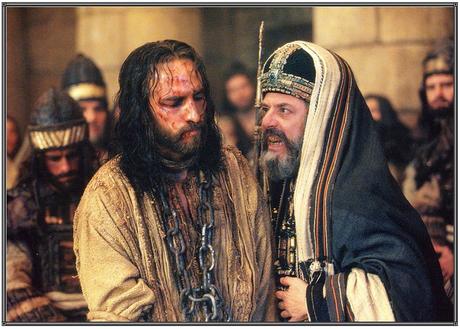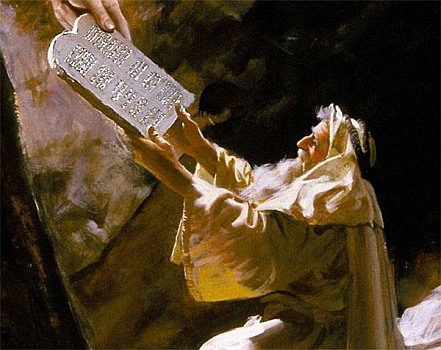My wife and I were recently invited to a sneak preview of the upcoming movie
Courageous. While I found the movie entertaining and emotionally moving, it was not quite blockbuster caliber. Overall, I give the movie a B.
The Message
The movie is an effort to sound a wake-up call to dads across the country--trying to get them to step up and be real fathers. I heartily agree with their great, redeeming message of good fatherhood (and it's a message we desperately need to hear), but I think Michael Catt and company try to beat the audience over the head with it, and I think this will make the movie ultimately less effective.
The opening scene draws all of us in to wonder "Would I have done that?" Nathan Hayes (played by
 |
Nathan Hayes (Ken Bevel) watching out for his daughter,
who is being romantically pursued by a young gang member. |
Ken Bevel) is filling up with gas when a man sneaks into his truck and drives away. Hayes jumps into action, sprinting after the truck and diving half-way into the driver's window. Clinging for life, fighting with the thief, and trying to avoid traffic, Hayes eventually gets control of the wheel and steers the truck off the road and into a tree as he bails out into the ditch. The thief exits the scene with his accomplice as shocked witness minivan moms call the police and rush to Hayes to see if he's okay, but he fights through them to get back to his vehicle and reveal that the motivation for his motor vehicle daredevilry was more than a mere machine. He opens the back door to reveal a crying baby in a car seat. Each viewer is stuck with the real question: "Would I have done that?" I thought this was an excellent way to set the stage for the audience to consider that question throughout the film.
This, however, is where we start to get hit over the head. Instead of letting the audience naturally come to this question and grapple with it, Catt & Co. force the issue. Police officer Adam Mitchell (Alex Kendrick) is driving away after having helped with Hayes' accident when he asks his partner "Would you have done it?" As they tried to discuss the issue without losing any of their macho bravado between each other, I couldn't help but wonder:
are they trying to spoon-feed us this question? This particular scene wasn't a bad addition, but it really was a harbinger of what was to come: plenty of emotionally charged scenes with an almost after-school-special-esque dialogue, explaining the moral of the situations.
The movie mostly revolves around four police officers (and also includes a construction worker who becomes their friend), and how they come to see that most of the men they are putting in jail come from fatherless homes, or homes where the father shows little attention to (or appreciation of) the kids. Instead of them being drawn to realize this throughout the movie, and allowing the viewers to do the same, the fact is presented to them by their chief in a meeting of the police force, starting something like "an e-mail came across my desk the other day with some surprising statistics." This situation could be believable, but the person cast for the police chief wasn't chosen for his public speaking abilities and the e-mail was given no credible source. For all we know, it could have been from his Aunt Martha who sends on every forward she receives without checking any of the facts. Again, I wondered: are they spoon-feeding us these statistics?
Don't get me wrong. I enjoyed my time. I certainly cried at a few of the tear-jerking scenes and laughed at some of the funny parts--there were elements of action, drama, some bits of suspense--but where I think this movie really breaks down is the dialogue in the crucial moments. When the drama gets thick, the dialogue goes flat. I think the writers did a great job of creating an environment in which the questions they're dealing with come up, but I found the actual conversations that work through the difficult situations to be contrived and unnatural.
The Effect
I predict that the problem with the dialogue will plague the movie's effect on secular audiences. While Christian audiences will understand the words and forgive the clunkiness, I think it will be a turn-off to many who don't believe. Yes, the message is a Biblical message, so there will be certain parties automatically disaffected, but the lingo and style is distinctly Evangelical Protestant, which (in my experience) tends to have its own lexicon, and a false assumption that everyone else knows what they're talking about or at least gets the idea right when it is spoken. I've found this particular conversational style to be ineffective when dealing with people outside of the particular group to which the jargon belongs.
The movie also draws the viewer through some extreme emotional situations, trying to pull down any
defenses, in the hope that the head-whacking with the message will be well received. This approach of selling an idea (and, again, this is a really good idea) through the use of
pathos (emotion) is often effective (commercial advertisers capitalize on it all the time), but that effect isn't always lasting. It isn't always enough for someone to change his/her life. It rallies the troops and makes some converts, but it doesn't sustain the morale. What is needed for that is a strong
logos (reason). This movie has some good
logos at some points, but it chiefly relies on pummeling us with
pathos, and I can't help but think that a number of non-Christian viewers will be turned off. I've had many conversations with many non-believers who are turned off by this sort of emotion-based faith. It lacks real substance. I agree. I'm turned off by it, too. That's one of the benefits of the rich intellectual treasures of the Catholic Church: a fantastic combination of
faith and reason. I think the movie brings up a really good topic (one that is much needed) and shows some men trying to strive for excellence in fatherhood (quite commendable), but the dialogical potholes and the overflowing emotional tide/head-whacking will keep it from being a huge success.
Effective Post-Climax
In order not to give too much more away, I'll just say that the climax of the movie is arguably a special scene for which the main characters get all dressed up. It is an exclamation point in the movie for the men and their families, and Catt & Co. do a good job of not stopping there. They continue on, showing that even when men are being real dads, there will still be trials. The movie doesn't simply end with a "happily ever after." There is still a fair amount of drama to go, but the men have changed, and the viewers are able to see how these particular men put biblical notions of fatherhood into rubber-hitting-the-road practice when the going gets tough. I thought this area was quite exceptional--it inspired me to work even harder at being a good husband (and hopefully a good father someday).
Cheesy Conclusion
In an almost shameless-self-promotion style, the movie wraps up with the predominant character, Adam Mitchell, standing up in front of his Sunday service, flanked by his buddies, giving a testimony about being a man. As he reaches the climax of his talk, he raises his hand Billy Graham-style (appropriately, since this
is, after all, a Baptist congregation in a movie made by a Baptist congregation) and calls out men to stand up and be real fathers. This was fine in itself, but as his words reached their peak and he raised his hand, the scene immediately flashes to the COURAGEOUS title block and intros the credits. It almost seems as though the whole movie was a commercial for the movie. Something about it just stood out as awkward.
Also, that Sunday service scene will lose some appeal for high-liturgy Christians. Granted, the movie is made by a Baptist congregation, so they have Baptist sensibilities and tend to cater toward Baptists, so it really should come as no surprise that their worship space looks more like a theater than a house of God. If it weren't for the cut-scene of the sign out in front of the building and the alb-laden choir in the stadium seating behind the stage, a Catholic might wonder why their congregation meets at the local concert venue.
Bottom Line: Is it worth going to see, or is it a "rentable"?
I have mixed thoughts on this one. Hollywood generally puts out a bunch of junk movies that have no redeeming moral quality. This one, however, has a great message, no scantily clad women, no sex scenes (nor even any innuendo), no obscene language, and generally leaves you inspired to live better. I really want to send Hollywood the message that this is the type of movie we're looking for, so our ticket dollars would be a good way to turn the tide a bit in Hollywood. Because of the above-menitoned downfalls, however, I know some will be turned off. I'd say that the good of the movie ultimately outweighs the bad, and that (if you can forgive a little cheesiness and heavy-handed message making) you'll have a really good movie-going experience. Ultimately, if men are inspired to be better fathers by this movie, it will be well worth the price of the ticket.




















